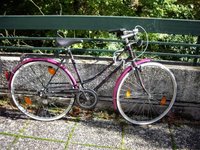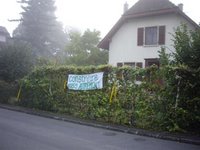
I've had the pleasure of seeing the seasons changing both in Europe and Oz. While the cicadas are coming out in Sydney, the leaves are dropping here in Geneva. I know this because I've seen both in the last week. When I glanced out of my window on my first day back at work, I noticed how yellow the final leaves of autumn are. The autumn coloured leaves of orange and brown have already fallen, but the remaining yellow leaves shimmer and glow in the twilight.
 The brief trip home was a chance to take in extra yellow rays of the sun, before I returned to winter. Pete and I found a cicada shell in his garden and some friends gave me ear-rings in the shape of cicada wings. I realised just how Australian these creatures are when I tried to explain them to a colleague - the fun of collecting live cicadas with extra prestige for the rarer "black prince" and "yellow monday", the buzzing sound on a summer evening, and the first cicada shell of the season.... but I guess you had to be there.
The brief trip home was a chance to take in extra yellow rays of the sun, before I returned to winter. Pete and I found a cicada shell in his garden and some friends gave me ear-rings in the shape of cicada wings. I realised just how Australian these creatures are when I tried to explain them to a colleague - the fun of collecting live cicadas with extra prestige for the rarer "black prince" and "yellow monday", the buzzing sound on a summer evening, and the first cicada shell of the season.... but I guess you had to be there.


